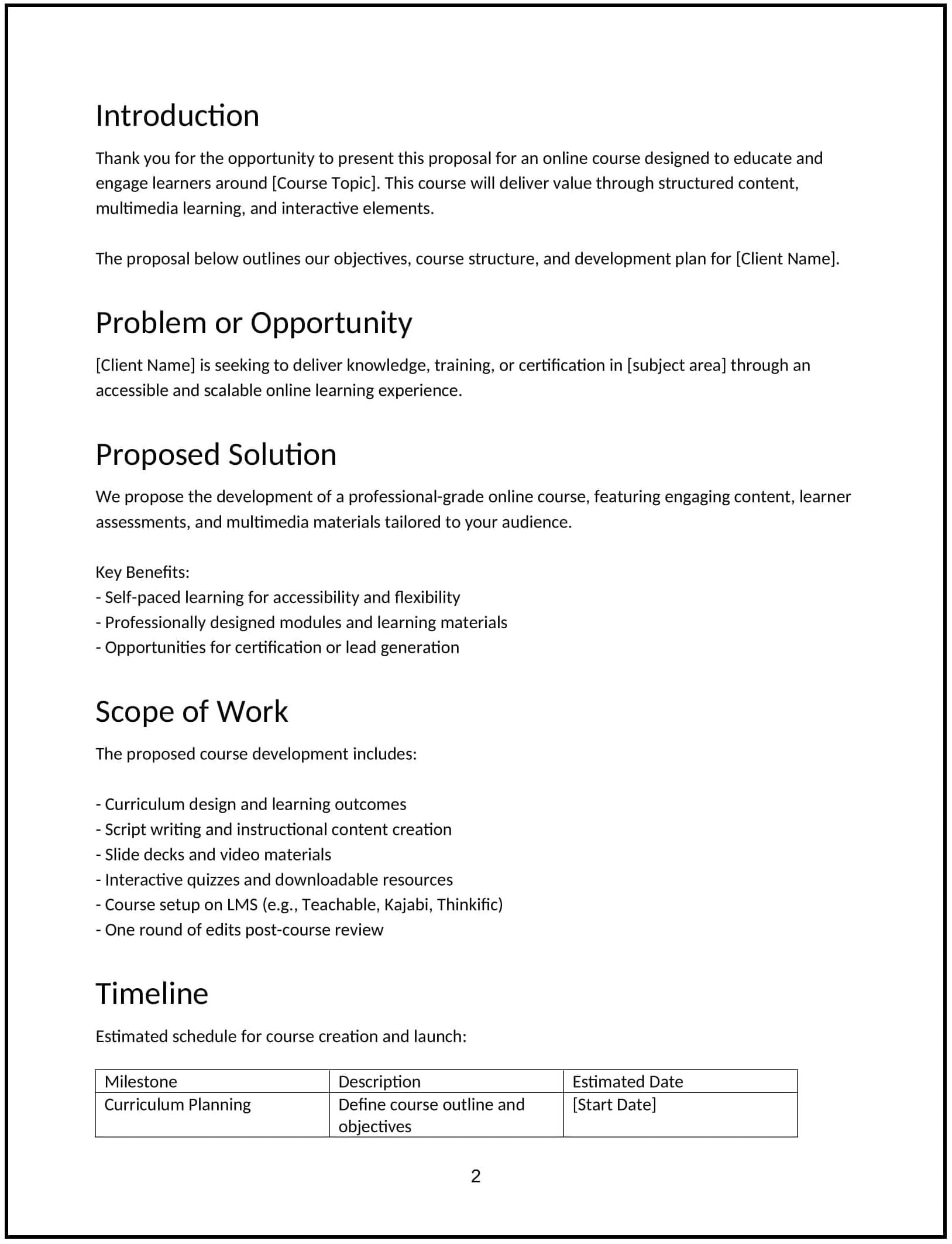Got contracts to review? While you're here for proposals, let Cobrief make contract review effortless—start your free review now.

Customize this template for free
Customize this free online course proposal with Cobrief
Open this free online course proposal in Cobrief and start editing it instantly using AI. You can adjust the tone, structure, and content based on your course topic, audience, and delivery format. You can also use AI to review your draft — spot gaps, tighten language, and improve clarity before sending.
Once you're done, send, download, or save the proposal in one click — no formatting or setup required.
This template is fully customizable and built for real-world use — ideal for pitching custom course development, licensing online learning modules, or proposing training programs to organizations. Whether you’re an independent instructor, education consultant, or learning platform, this version gives you a structured head start and removes the guesswork.
What is an online course proposal?
An online course proposal is a document used to outline the structure, content, and delivery method of a new course — typically aimed at gaining client approval, funding, or institutional support. It includes the course objectives, syllabus, delivery format, timeline, and pricing.
This proposal is useful whether you're pitching a course to a corporate training team, licensing it to a university, or developing a course for a client’s internal LMS.
A strong course proposal helps you:
- Define what learners will gain and how the course is delivered
- Show expertise in instructional design and course outcomes
- Clarify the timeline, materials, and technology stack
- Move your course from idea to approval faster
Why use Cobrief to edit your proposal
Cobrief makes it simple to write, revise, and deliver a high-quality proposal — with built-in AI to refine your messaging every step of the way.
- Edit the proposal directly in your browser: No formatting tools or downloads required.
- Rewrite sections with AI: Adjust tone, tighten copy, or reframe your offer instantly.
- Run a one-click AI review: Improve clarity and eliminate vague sections fast.
- Apply AI suggestions instantly: Accept changes one by one or apply all in a single click.
- Share or export instantly: Send your proposal via Cobrief or download a clean PDF or DOCX version.
Skip the formatting — focus on getting your course approved and launched.
When to use this proposal
Use this online course proposal for:
- Developing custom training programs for a client.
- Pitching educational content to a business or university.
- Proposing a certification or skills-based online course.
- Partnering with a platform to publish your course.
- Getting internal buy-in for corporate e-learning initiatives.
It works for both self-paced and instructor-led formats.
What to include in an online course proposal
Each section helps the reader understand your course, how it’s delivered, and why it matters:
- Executive summary: Describe the target audience, learning need, and how your course addresses it. Highlight the impact or outcomes learners can expect.
- Scope of work: List the key components — e.g., number of modules, length of each, types of content (video, quizzes, assignments), and delivery format (self-paced, hybrid, live).
- Learning objectives: Clearly define what learners will know or be able to do by the end of the course.
- Course structure and curriculum: Break down the course into sections or modules, with short summaries of what each one covers.
- Delivery format and platform: Describe how the course will be delivered (e.g., LMS, custom site, hosted platform) and what tools are required.
- Timeline: Provide key dates for content creation, review, launch, and any live sessions or cohort start dates.
- Pricing: Outline the fee for course development or licensing. Clarify whether this includes instructional design, media production, revisions, and ongoing access.
- Terms and conditions: Cover intellectual property, usage rights, update schedules, and cancellation terms.
- Next steps: End with a clear CTA — like “Reply to approve,” “Schedule a kickoff call,” or “Sign to move forward.”
How to write an effective online course proposal
This proposal should feel educational, outcome-driven, and professionally structured:
- Focus on learner value: Show how the course solves a real knowledge or skill gap.
- Emphasize structure and planning: Highlight your clarity on curriculum and delivery.
- Use clear and concise language: Avoid jargon or overly academic tone.
- Be specific about logistics: Clients want to know how and when the course will be delivered.
- Format for clarity: Use bullet points, subheadings, and short sections.
- End with a frictionless action: Give your client one easy way to move forward.